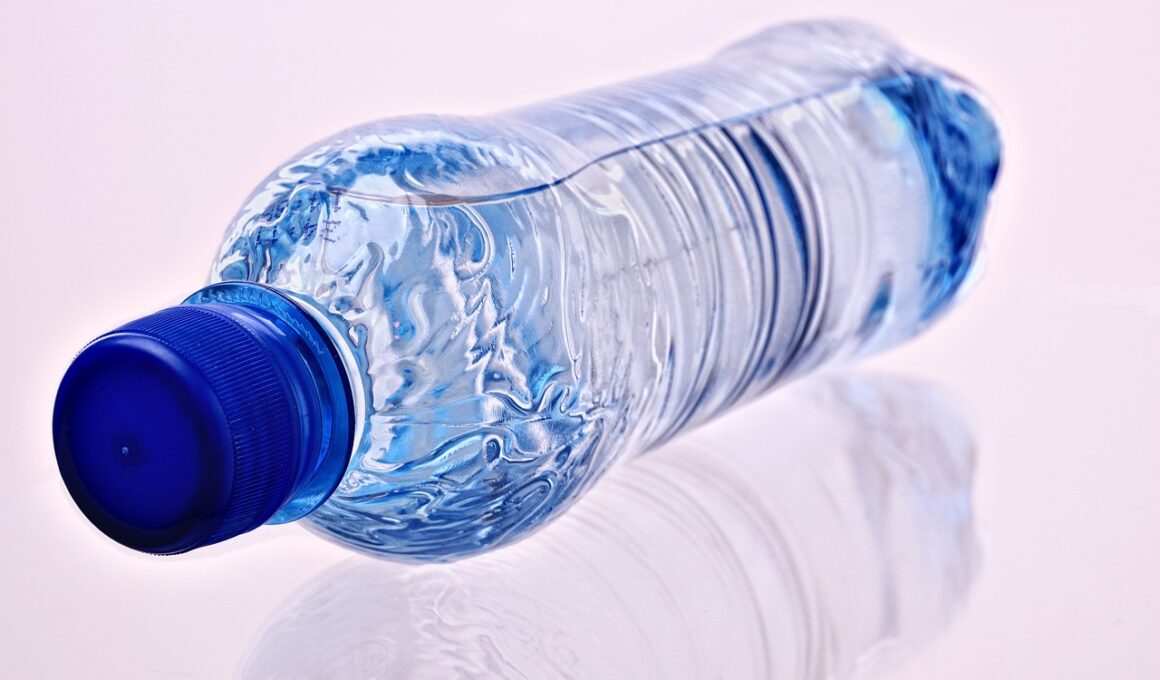Personalized Hydration Plans Based on Monitoring Data
Understanding hydration needs can greatly enhance individual health and well-being. Monitoring water intake is vital, as everyone’s hydration requirements vary based on factors like age, weight, activity level, and climate. Personalized hydration plans can be crafted by analyzing these specific factors. One effective method of tracking hydration levels is through wearable technology. Devices like smartwatches and fitness trackers can record fluid consumption as well as sweat loss. Additionally, keeping a food diary that logs hydration through meals and beverages can offer insights. To establish a reliable hydration strategy, participants should aim to balance water intake with daily physical activities. Regular hydration checks can assist in avoiding dehydration-related issues. This is especially crucial for those engaging in rigorous sports or demanding physical labor. Furthermore, users are advised to recognize the signs of dehydration such as thirst, dry skin, and fatigue. By employing various monitoring tools, a more tailored hydration approach can emerge, fostering better fitness outcomes and enhancing overall health and performance. Each person’s hydration plan should be continually updated to reflect changing needs over time.
Various techniques exist for effectively monitoring hydration levels and ensuring adequate fluid intake. Traditional methods include the use of scales or urine color charts. The latter offers a straightforward visual cue for hydration status, where lighter urine generally indicates better hydration. Additionally, more advanced approaches include mobile applications designed to help track daily water consumption patterns. These apps often come with reminders to encourage regular drinking habits throughout the day. Proper hydration can also be aided by understanding one’s own sweat rate during activities. This variable can significantly influence how much fluid is needed before, during, and after exercise. For those less inclined towards technology, a simple method involves carrying a water bottle and setting personal goals for refills throughout the day. The key is consistency and developing a routine that suits each individual’s lifestyle. Moreover, incorporating hydrating foods such as fruits and vegetables into the diet provides additional hydration benefits. This holistic approach ensures that hydration is not solely reliant on water consumption but also includes nutritious food sources contributing to overall hydration needs.
Setting hydration goals based on the data collected from monitoring techniques is crucial for individual well-being. A personalized hydration goal can be based on the amount of water one needs to drink daily, taking into account various influencing factors discussed earlier. For instance, someone engaging in high-intensity workouts or living in a hot climate should adjust their goals upwards. In contrast, less active individuals may require lower amounts of fluid intake. Additionally, hydration should be adjusted during illness or when consuming higher amounts of salty food. Those seeking to increase their hydration levels should gradually augment their intake to avoid potential discomfort. Full hydration plans may utilize water-rich foods integrated into the daily meals. Encouragement towards drinking water before feeling thirsty is essential, as thirst can often signal that dehydration is already occurring. Another aspect worth considering is the use of electrolyte drinks post-exercise, which can help restore fluid and salt levels lost during sweat. By integrating various techniques for tracking and adjusting hydration intake appropriately, individuals can optimize their performance and improve their health consistently over time.
Challenges in Hydration Monitoring
Despite the various available methods for monitoring hydration, challenges persist. Individuals may overlook their hydration needs when busy or engaged in demanding tasks. Moreover, many people misinterpret feelings of hunger for thirst, which can lead to inadequate fluid intake. This is especially common among those who are active during the day. Furthermore, cultural habits and personal preferences can influence hydration practices negatively. Some might find plain water unappealing and thus avoid drinking fluids altogether. It’s crucial to find alternative solutions tailored to individual tastes. Flavored water or herbal teas can supplement daily hydration needs without compromising personal preference. Another challenge is misinformation surrounding hydration requirements; for example, many believe the common eight glasses of water guideline applies universally. In reality, every person’s hydration needs differ significantly. Climate, physical activity, diet, and health conditions all impact requirements. Finally, continuous education on the importance of hydration can significantly aid in overcoming these hurdles and raise awareness of individual hydration needs through tailored strategies and monitoring methods.
Implementing personalized hydration strategies can ensure individuals meet their unique hydration needs. By combining knowledge from monitoring methods with individual preferences, hydration plans can be extremely effective. Continuous assessment of one’s hydration level using tech and self-assessment techniques enables necessary adjustments. Finding the right balance of water intake may take some time and requires focus on personal habits. Regularly evaluating the choices surrounding drinks and food intake can further inform hydration choices. Developing a routine that includes hydration breaks during work or exercise serves as a reminder to consume needed fluids. For those embarking on new hydration plans, it is beneficial to consult hydration professionals or dietitians specializing in nutrition. They can provide tailored advice based on personal health factors and performance goals. Moreover, incorporating varied sources of hydration, including fruits and salads into one’s diet, can enrich hydration strategies while providing electrolytes. Ultimately, the main goal remains increasing awareness about the importance of hydration. As more individuals actively participate in their health management, hydration should be recognized as a vital component that contributes to overall wellness and vitality.
Long-term Hydration Monitoring Benefits
Long-term adherence to hydration monitoring can yield significant health benefits. Over time, individuals who maintain a consistent focus on hydration often notice improved energy levels, enhanced athletic performance, and clearer skin. Furthermore, chronic dehydration can lead to various health issues, including kidney stones, urinary tract infections, and constipation. Therefore, monitoring hydration can help mitigate these risks effectively. Engaging in consistent hydration practices is linked to better mood regulation and mental clarity. Many athletes report improved focus and cognition when adequately hydrated. With continued monitoring, individuals can better understand their hydration patterns, allowing them to modify behaviors over time. Such foresight strengthens the relationship between lifestyle choices and overall health. Additionally, a community of individuals committed to hydration can encourage one another to employ effective strategies. These shared experiences lead to significant organizational improvements in hydration habits. The long-term effects of personalized hydration plans underscore the priority of implementing systematic monitoring methods to ensure hydration becomes an integral part of daily routines. A commitment to such habits bolsters the individual’s quality of life, fostering a culture of health and well-being across diverse communities.
In summary, personalized hydration plans based on careful monitoring data represent a vital piece of health. Successful hydration strategies encompass understanding one’s specific needs, employing a mix of techniques for tracking fluid intake, and setting realistic goals for hydration based on individual habits. Regularly assessing hydration levels through physical feedback will promote healthier choices and enhance overall physical performance. The combination of traditional methods along with modern technology can bring forth a more balanced approach. Furthermore, overcoming challenges tied to hydration awareness will ensure that people stay informed and responsive to their hydration requirements. It encourages adopting positive hydration habits, forming a community dedicated to well-being. With time, improved hydration strategies create momentum towards a healthier future. Therefore, integrating personalized hydration monitoring into daily life should become a priority for everyone seeking to maximize health benefits, athletic success, and overall vitality. By recognizing the importance of hydration in our lives and ensuring all individuals have access to education and resources, we can collectively work towards a healthier society that values the significance of staying hydrated every day.


